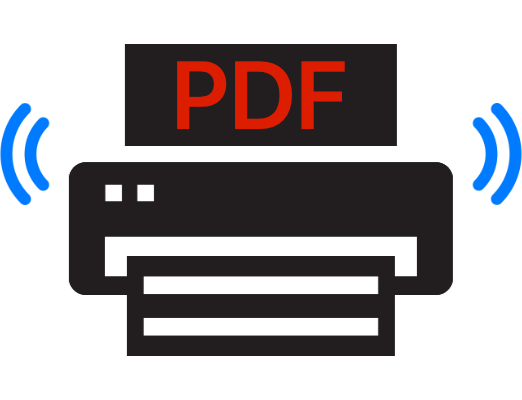You wanna print or save something as PDF on your iOS device? Especially keeping those texts as they are, instead of being images. Well, Apple's iDevices don't come with such a feature by default, but don't worry, we provide you a neat solution here - a virtual PDF AirPrint printer!
To enable AirPrint of a printer, below requirements must be fulfilled, as described here.
-
The printer must be advertised with Bonjour broadcasting.
-
The printer must communicate with the client using IPP (Internet Printing Protocol).
-
Build
# Assume you're in this project's root directory, where the Dockerfile is located docker build -t air-pdf-printer . # Build with argument, set your own admin password instead of the default one docker build --build-arg ADMIN_PASSWORD=<YourPassword> -t air-pdf-printer . # Or directly pull the image from Docker Hub docker pull thyrlian/air-pdf-printer
The default admin username is
root, and the default admin password is here. -
Run
# Run a container with interactive shell (you'll have to start CUPS print server on your own) docker run --network=host -it -v $(pwd)/pdf:/root/PDF -v $(pwd)/cups-pdf:/var/spool/cups-pdf --name air-pdf-printer air-pdf-printer /bin/bash # Run a container in the background docker run --network=host -d -v $(pwd)/pdf:/root/PDF -v $(pwd)/cups-pdf:/var/spool/cups-pdf --name air-pdf-printer air-pdf-printer
-
Notes
-
Multi-Arch: This Docker container would also work on ARM-based computer, you just need to build the Docker image properly. Here I'm not gonna talk about Docker's experimental feature
buildxfor multiple architectures support, you can find more information here and here on your own. In order to build for the appropriate CPU architecture, we can simply use the right base image in the Dockerfile.# Change base image to ARMv7 architecture sed -i.bak "s/FROM ubuntu:/FROM arm32v7\/ubuntu:/" Dockerfile && rm Dockerfile.bak # Change base image to x86_64 architecture sed -i.bak "s/FROM arm32v7\/ubuntu:/FROM ubuntu:/" Dockerfile && rm Dockerfile.bak
-
Network: With the option
--network=hostset, the container will use the Docker host network stack. When using host network mode, it would discard published ports, thus we don't need to publish any port with theruncommand (e.g.:-p 631:631 -p 5353:5353/udp). And in this way, we don't requiredbus(a simple interprocess messaging system) package in the container. However, thedbusservice is still needed on the host machine, and even it is deactivated, it would be automatically triggered to active whenavahi-daemonstarts running. For more information about Docker's network, please check here and here. Please be aware, the host networking driver only works on Linux hosts, and is not supported on Docker Desktop for Mac, Docker Desktop for Windows, as stated here. -
Port: Apple is using UDP port 5353 to find capable services on your network via Bonjour automatically. Even though mDNS discovery uses the predefined port UDP 5353, application-specific traffic for services like AirPlay may use dynamically selected port numbers.
Port TCP or UDP Service or protocol name RFC Service name Used by 5353 UDP Multicast DNS (MDNS) 3927 mdns Bonjour, AirPlay, Home Sharing, Printer Discovery
-
-
Output
CUPS-PDF output directory are defined under Path Settings which is located at
/etc/cups/cups-pdf.conf. And the default path usually is:/var/spool/cups-pdf/${USER} -
Troubleshoot
-
CUPS logs directory:
/var/log/cups/ -
Start Avahi daemon with verbose debug level:
avahi-daemon --debug
-
-
Commands
# Run all init scripts, in alphabetical order, with the status command service --status-all # List units that systemd currently has in memory, with specified type and state systemctl list-units --type=service --state=active # Start CUPS service service cups start # Start Avahi mDNS/DNS-SD daemon service avahi-daemon start # Shows the server hostname and port. lpstat -H # Shows whether the CUPS server is running. lpstat -r # Shows all status information. lpstat -t # Shows all available destinations on the local network. lpstat -e # Shows the current default destination. lpstat -d # Display network connections, you need to have net-tools package installed netstat -ltup # Browse for all mDNS/DNS-SD services using the Avahi daemon and registered on the LAN avahi-browse -a -t # Find internet printing protocol printers ippfind ippfind --remote
-
Manage
Web Interface: http://[IpAddressOfYourContainer]:631/
-
Add Printer
Copyright (c) 2020 Jing Li. It is released under the Apache License. See the LICENSE file for details.
The AirPrint-PDF.service static service XML file for Avahi is created via airprint-generate script.





